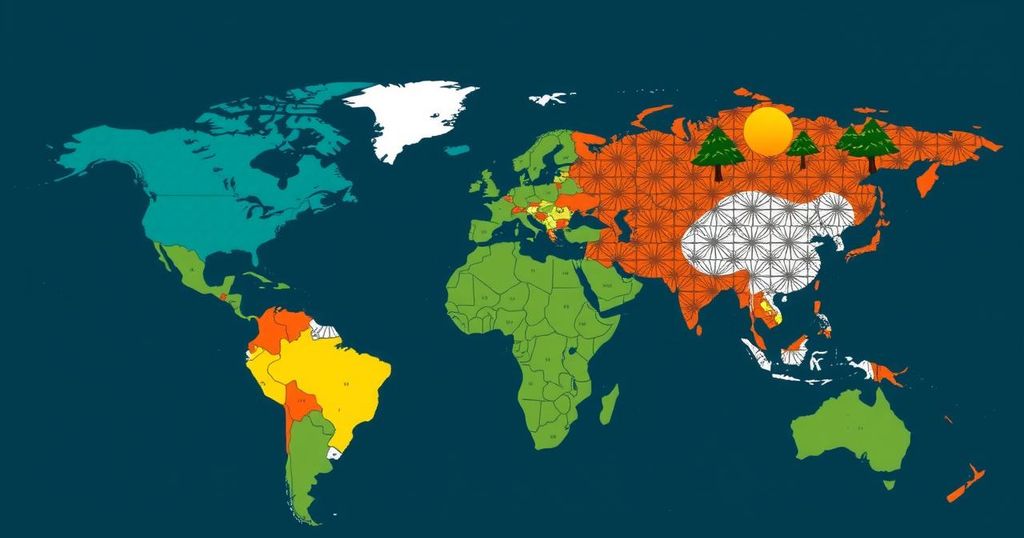Emerging Climate Compensation Initiatives for Vulnerable Nations
Wealthier nations are initiating payments to poorer countries for climate change-induced damages, with approximately $720 million pledged for compensation. This funding aims to assist communities like those affected by Cyclone Freddy in Malawi, where families are facing extreme weather challenges. Ongoing discussions at COP29 highlight the urgent need for more extensive funding and a broader application of financial resources to support those impacted by the climate crisis.
The devastating impact of climate change is increasingly felt in low-income countries, exemplified by the case of Christopher Bingala in Malawi, who lost his home to Cyclone Freddy. In a significant move towards addressing these challenges, wealthier nations have begun providing financial compensation for climate-related damages. A newly established fund, amounting to around $720 million, aims to support those affected by natural disasters resulting from climate change. Although welcomed, experts caution that these funds may fall short as climate-related disasters escalate.
At the ongoing COP29 climate summit in Baku, negotiations are focused on the scope and distribution of such compensation. Prime Minister Philip Davis of The Bahamas stresses the urgency for developed nations to acknowledge and assist in rectifying the damages caused by their carbon emissions. The aftermath of Cyclone Freddy alone displaced thousands, leaving families to rely on temporary camps and limited resources as they struggled to recover.
Bingala’s family, once subsistence farmers, benefitted from a token payment of approximately $750, aiding them in rebuilding their lives in a safer area. This initiative, rolled out by the Scottish government – the first to dedicate funds for loss and damage – illustrates a new approach to climate financing. Many families received similar payments, which significantly contributed to recovery efforts despite the ongoing risks of extreme weather events.
The funds are being distributed through local non-profit organizations like GiveDirectly, targeting the most vulnerable households who typically lack insurance and adequate protection against climate impacts. As demonstrated by rising national debts incurred following natural disasters, the need for substantial and effective loss and damage funding is becoming increasingly critical.
Proponents of the fund argue for a broader application of resources, emphasizing the necessity of preparing for future threats such as coastal erosion and preserving cultural heritage sites. As climate disasters intensify, experts predict that the annual cost for loss and damage could surpass $250 billion by 2030, prompting developed nations to act swiftly in their contributions. Should no action be taken, the repercussions of climate change will reach beyond borders, potentially resulting in refugees and lost lives.
The evidence is clear – the plight of low-income nations due to climate change necessitates immediate international cooperation and funding to safeguard communities and foster resilience in the face of advancing climatic challenges.
The article discusses the emerging issue of “loss and damage” compensation as a response to the increasing devastation caused by climate change in poorer countries. It highlights the case of a family in Malawi affected by Cyclone Freddy, which illustrates the dire need for financial assistance from wealthier nations. The narrative outlines the recent pledges made by developed countries to compensate less affluent nations for climate-related destruction, emphasizing the obligations of higher-emission countries to support those who contribute minimally to global pollution yet suffer the most from its effects. It also touches upon ongoing discussions at COP29 regarding the establishment of a functional funding mechanism to address these urgent needs.
In conclusion, the establishment of loss and damage compensation funds is a significant step towards addressing the inequities faced by lower-income countries heavily impacted by climate change. However, with ongoing negotiations and the anticipated rise in climate disasters, the financial resources pledged may prove insufficient. It is imperative that affluent nations recognize their responsibilities and enhance their contributions to truly support vulnerable communities in rebuilding their lives and adapting to an increasingly volatile climate.
Original Source: www.wmuk.org




Post Comment